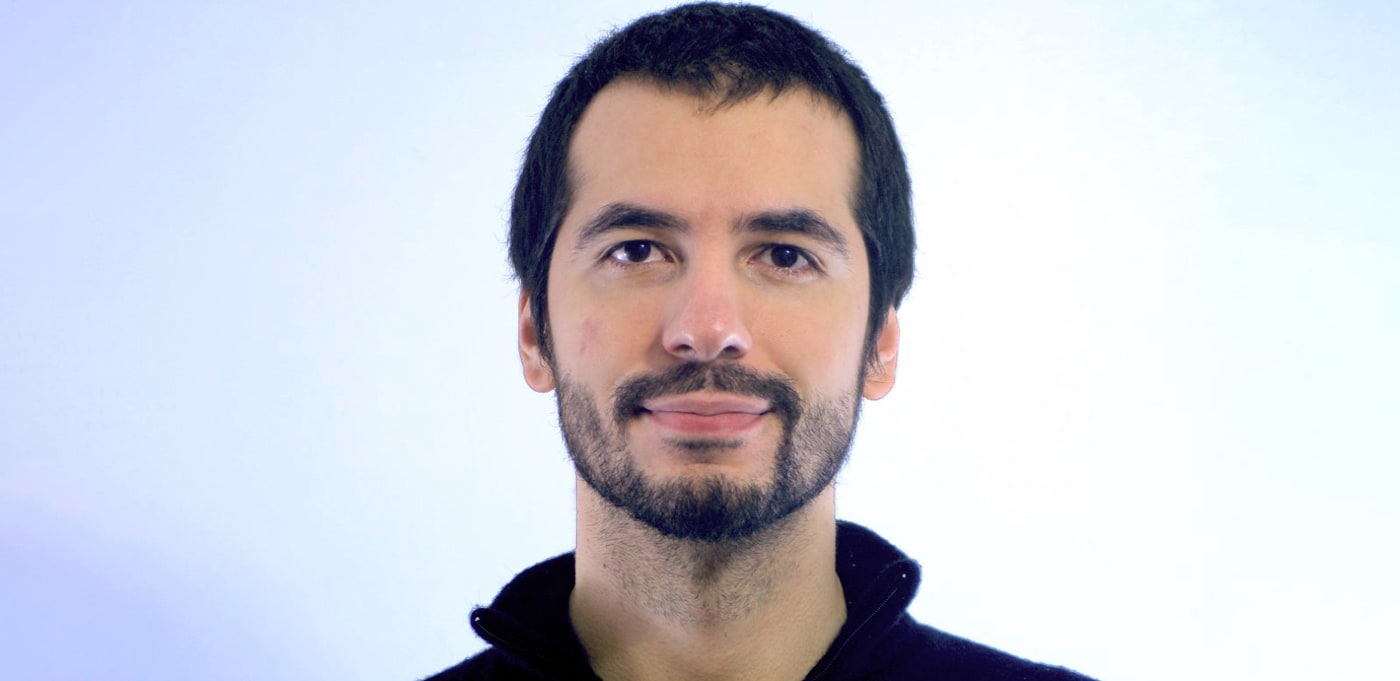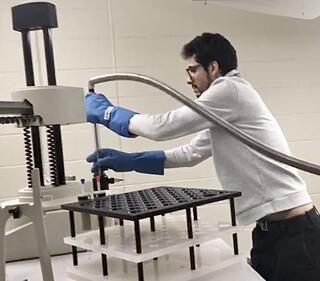
Our graduate students and postdoctoral researchers play an enormous role in the transition to a sustainable, resilient, and affordable energy future that is centered on social and economic equality. From lab experiments to field work to classrooms, these leaders of today and tomorrow are our catalysts for energy discovery. In this new series, we learn more about what inspired these talented researchers, what brought them to their field of study, and the questions that drive their work at the Great Lakes Bioenergy Research Center (GLBRC).
This week we check-in with Manar Alherech. Prior to successfully defending his thesis in January, Dr. Alherech spent six years as a graduate student in Shannon Stahl’s lab at the University of Wisconsin–Madison.
Hometown: Home is New York, where my parents live right now. I grew up in Brooklyn, and I’d very much like to visit them when the pandemic winds down.
What brought you to UW–Madison and to GLBRC?
I came to Wisconsin because it was the grad school I wanted to go to when I was applying. So when I got in, I said, “Yeah, I'm going to Madison!” I had done summer research in a lab adjacent to two professors who had done their PhDs at UW–Madison, and they were adamant about what an amazing experience it was and that a lot of really cool research comes out of here. GLBRC actually was kind of a happy accident, so to speak. I joined Shannon's group because he was doing electro-organic synthesis, and I was really interested in that project direction. I started working on a project focused on lignin oxidation and I never turned back.
What is one thing that has surprised you about UW, Madison or Wisconsin?
Madison has surprised me in that I really like the balance and the scale of the city. It's an amazing place to live. As I've continued exploring the city, I'm just always kind of surprised by just how much is going on. Obviously, the pandemic has changed that for a lot of us, but the city is adapting and keeping the people that live here engaged in spite of the restrictions. There's something here for everyone.
"What stood out to me about lignin is it’s complementarity to popular renewable energy sources like solar and wind. Sustainably providing the benefits we get out of plastics, solvents, pharmaceuticals and so much more is something I feel we underappreciate as a society."
Tell us about your research, in a way you would describe it to friends or family.
I always come at it from the perspective of paper making, because that's something that we’re all kind of familiar with. When we make paper, we cut trees down and chemically process them to separate the cellulose, which is what actually gets pressed into the paper, from the rest of the tree, which contains a lot of lignin. Lignin has been kind of this mystery to chemists for over a century. But with recent developments, we've started understanding what its structure looks like and how we can utilize it. So, we're looking at methods to break lignin down into various small molecules and then purify these compounds from one another. In particular, I'm looking at liquid-liquid chromatography, which is a way to run a separation on a complex mixture, but without pitfalls that come up when you try to do separations on lignin depolymerization mixtures with other techniques.
What is a practical use/application of your research outside of the lab?
The hope is that we can help pave a way to obtaining pure compounds from lignin to replace materials we typically get from crude oil or fossil fuels, but bio-renewables have a catch-22 to overcome. We already know what materials are valuable and easy to obtain from petroleum resources, but that isn’t true for bio-derived materials. There isn't a market for lignin derived materials because the compounds aren’t readily accessible and we don’t know which ones will fill what needs. So, the real answer is we don't know yet. We need to see how other scientists are interested in using these compounds and work with them to craft a new platform of bio-renewable materials.

What led you to this area of research/study?
I kind of discovered it by accident. I've always had an appreciation for sustainable efforts, but never considered how we would fulfill the conveniences offered by materials. What stood out to me about lignin is it’s complementarity to popular renewable energy sources like solar and wind. Sustainably providing the benefits we get out of plastics, solvents, pharmaceuticals and so much more is something I feel we underappreciate as a society.
What do you hope to be remembered for after your time at GLBRC?
I guess my scientific contributions! I hope the separations we're doing provide better insights into lignin research. I was talking about liquid-liquid chromatography before — it's a technique that hasn't been demonstrated often in the world of lignin research, but I think it's an approach that can help us answer our questions. I hope this technique brings great insights into lignin structure, depolymerization, and valorization.
What is your favorite memory at GLBRC?
All the conferences we went to! For the GLBRC annual science meeting, we got together outside of Wisconsin Energy Institute or the engineering building at five in the morning to take a bus over to wherever it is we were going, and it would be a blast. We spent up to three days straight doing nothing but talking about science and eating food together. It was just really fun experiences and I hope we can get back to that once the pandemic resolves.
What’s something you’ve done or experienced that no one else you know has done?
I've been to Syria quite a few times because that's where my parents are from. Considering the recent conflicts and tensions in the Syrian-U.S. relationship, there aren't many people that I know who have been there.
What do you like to do when you’re not at work?
I like watching films. Rather than a TV, I’ve got a projector aimed at a wall because I think that's the best way to enjoy a cinematic experience at home. I also enjoy board games and playing music. In college, some friends and I started a student-run orchestra that did its own fundraising and organized its own concerts. The catch is that we only played music written by people in the group, so it was just constant creativity!